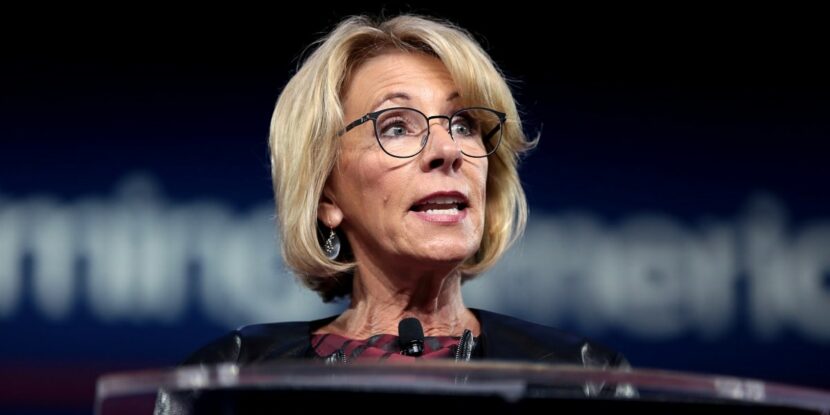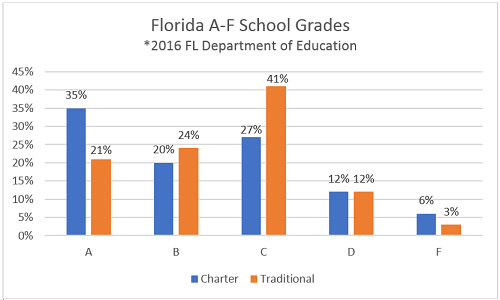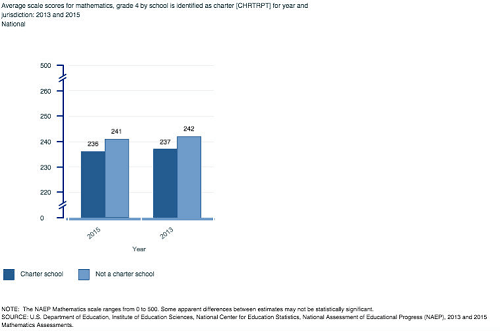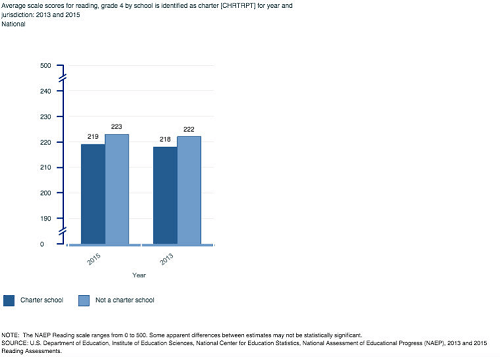Charter school and voucher expansion has been a hot topic across the nation at both the state and federal levels. Interest and grave concern about this expansion, especially at the federal level, has intensified from all points on the political spectrum in light of several recent developments: Florida’s bill serving as a trial run, the release of President Trump’s first federal education budget, Secretary DeVos’ recent testimony and speech, and the Jeb Bush-led promotion of these ideas.
Betsy DeVos is very correct when she remarked in her prepared testimony about the federal education budget at the US House Appropriations Committee this week:
Unfortunately, I don’t think any of us are happy with the results of these seemingly endless, Washington-led reform efforts. Most discouragingly, the achievement and attainment gaps experienced by poor and minority students, who are the primary focus of these Federal education programs, remain unacceptably large.
However, her budget prescriptions to fix these problems are very concerning. Here are the line items from the budget summary:
A $250 million increase for the Education Innovation and Research program for competitive awards for applicants to provide scholarships for students from low-income families to attend 3 the private school of their choice and to build the evidence base around private school choice.
A $167 million increase for the Charter Schools program to strengthen significant State efforts to start new charter schools or expand and replicate existing high-performing charter schools while providing up to $100 million to meet the growing demand for charter school facilities. [This would be on top of the $4 billion that has already been spent on charters at the federal level since 1995].
There are two major reasons this will not work.
1) Increasing Government Tentacles into Schools
First — apart from public school advocates’ concern about diverting public school funding to unaccountable private entities that do not have elected school boards responsive to parents — the public, charter, and private school vouchers, especially at the federal level, will increase government control and strings. The biggest string to be concerned about is the Common Core-aligned state tests. What is tested is taught. Because charter schools are public schools, they are required by state and federal law to give the same federal- and state-mandated tests required in traditional public schools. This means that charter schools really can’t innovate, and charter school students are still subject to the invasive surveys, social emotional indoctrination, and expanding unprotected personal data collection we have warned about in recent articles.
Jeb Bush, when writing Mitt Romney’s education plan during the 2012 presidential campaign, clearly stated that “to ensure accountability, students using federal funds to attend private schools will be required to participate in the state’s testing system” (emphasis added). Given that Bush and DeVos are such close allies in expanding Common Core and FedEd, it would be hard to imagine a federal voucher plan without that very dangerous entanglement.
It is heartening to see, however, that even conservative groups that strongly support school choice and have not written much about these dangers are now starting to speak up. Lindsey Burke of the Heritage Foundation was quoted in U.S. News and World Report saying of the school choice budget proposals:
It would grow rather than reduce federal intervention, and we should really be focused on reducing federal intervention…I think [the proposal] is something that could be fraught with regulations…Even if that doesn’t happen now, we have to think down the road what does that program look like under other administrations.
Rick Hess of the American Enterprise Institute gave similar comments to USA Today:
He said his biggest concern was that federal regulations, oversight and vast infusions of cash could “distort” an eclectic, and in some cases thriving, private-school market.
In addition to Education Liberty Watch’s School Choice Freedom Grading Scale, Lisa Hudson of Arizona gave an excellent summary of Why Conservatives Should Rethink Their Support for School Vouchers:
Under Indiana law, private and parochial schools that accept vouchers are subject to the state’s A-F Accountability system; a system that forces private and parochial schools to teach to the test like every other government school. Many school voucher programs set tuition caps that forbid a private school from charging any tuition or fees beyond the amount of the voucher. In Wisconsin, a religious school may not require a student to participate in religious activities without parental consent. In Maryland, a private school many not discriminate based on sexual orientation. Still other programs have mandatory accreditation requirements, prohibit religious schools from compelling prayer or worship, and classify school personnel as municipal employees subject to collective bargaining provisions. A voucher program in Cleveland, Ohio, prohibits the teaching of “…hatred against any person or group.” Which begs the question: does teaching traditional marriage constitute hatred against a person or group?
2) Charter Schools Don’t Improve Student Performance
The second, much more practical reason charter school expansion will not work is that these schools do nothing to improve student performance in failing, inner city schools in poor districts. DeVos apparently doesn’t or won’t realize that if the federal government has been funding charter schools since 1995, they ought to be included in the “seemingly endless, Washington-led reform efforts” that have failed as she described in her testimony. I recently wrote about Florida’s admission that there is a higher percentage of failing charter schools in Florida compared to traditional public schools — as even admitted by Jeb Bush’s own foundation:
Here is even more evidence of charter schools’ failure to help the students who most desperately need it. Just as with the Florida example, there is evidence from the National Education Policy Center that charter schools underperform public schools on National Assessment of Educational Progress (NAEP) scores:
Out of the 28 total comparison tests run, only 4 times did charters produce higher composite score averages than non-charter neighborhood public schools.
Here are some examples from that study:
Despite Jeb Bush’s frequent statements that “parents know best for their children,” with these efforts at the federal level, parents are not likely to keep their inherent right to be able to choose whether their children are taught or tested via Common Core or to opt out of invasive data mining or psychological profiling. C.S. Lewis’ quote in Hudson’s piece is truer than ever:
Indeed the safest road to Hell is the gradual one – the gentle slope, soft underfoot, without sudden turnings, without milestones, without signposts…
Parents and citizens must beware of education reformers like Betsy DeVos, Jeb Bush, and their allies — including Florida Speaker Richard Corcoran — bearing these pleasantly wrapped packages tied up with dangerous, ineffective strings.
Photo credit: Gage Skidmore





